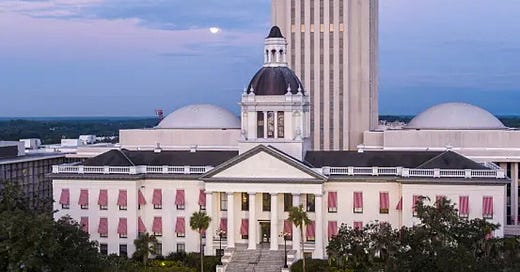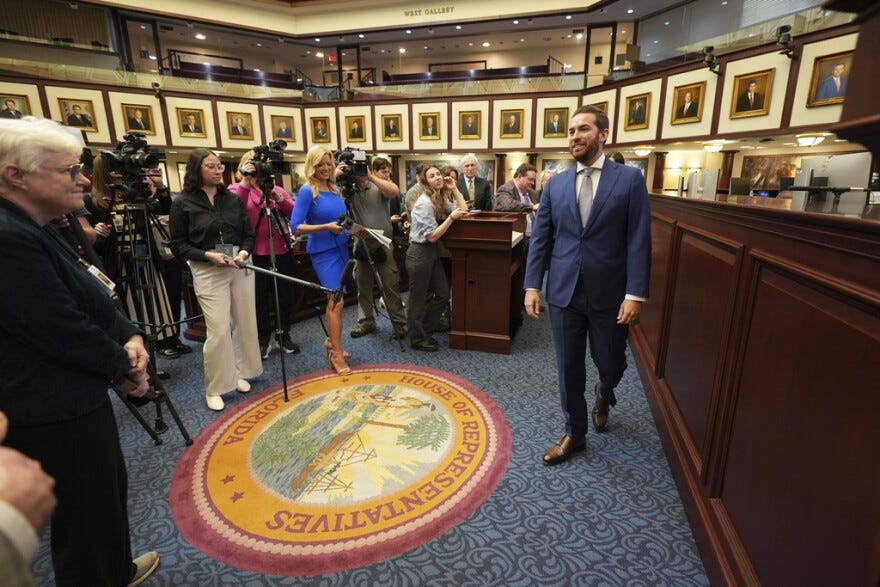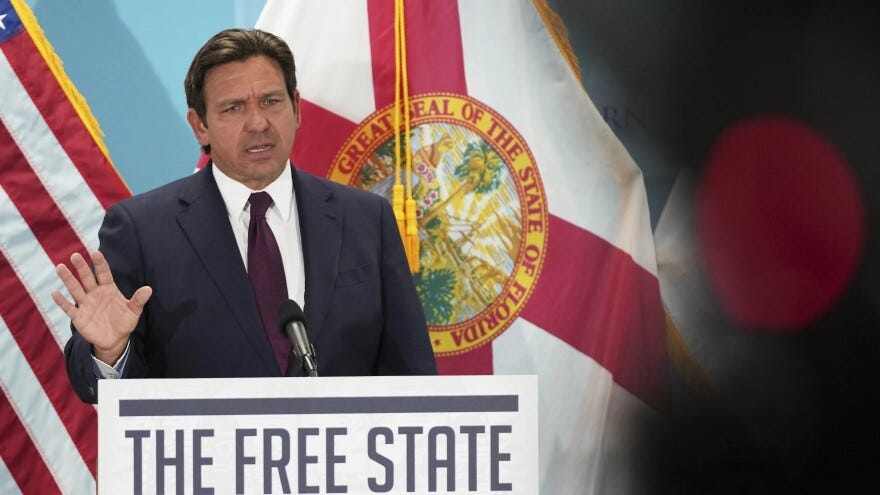Florida’s Legislative Session Ends Without Budget & Lawmakers to Consider 16 Bills in Extended Session
May 8, 2025 - This Week's News from Central Florida
Welcome to this week’s edition of the Central Florida Times, an independent, reader-supported newsletter focusing on the Sunshine State. These are the most important stories you need to know from across Central Florida. To never miss an update, subscribe here:
Here’s the latest from Central Florida…
Florida’s Legislative Session Ends Without Budget, Lawmakers to Return to Capitol
Florida lawmakers failed to complete their one constitutional duty—passing a state budget—before the end of the 60-day legislative session, forcing them to reconvene on May 12 for extended negotiations. The state constitution requires the Legislature to approve a balanced budget before the new fiscal year begins on July 1, but deep disagreements between Republican House and Senate leaders over tax cuts and spending priorities left the process deadlocked. At the heart of the impasse are differences between the chambers over the scale and structure of tax relief. House Speaker Daniel Perez (R-Miami) has pushed for a permanent reduction in the state sales tax from 6% to 5.25%—a move estimated to cost $5 billion annually. Senate President Ben Albritton (R-Wauchula) favored a more measured approach, proposing targeted sales tax holidays and a permanent exemption on clothing under $75, citing concerns about the state’s long-term financial stability. Further stalling talks is the $4.4 billion difference between the House’s $112.95 billion plan and the Senate’s $117.35 billion proposal. A framework proposing $2.8 billion in tax reductions, including a permanent $1.6 billion sales tax cut, has been reportedly outlined ahead of lawmakers’ return to the Capitol next week. Despite early cooperation, tensions in Tallahassee quickly escalated between legislative leaders, including an ongoing heated feud between Speaker Perez and Gov. Ron DeSantis. The conflict has spanned months, first arising when DeSantis called a special legislative session in January to push for stronger immigration enforcement measures. In response, Perez, along with Senate President Albritton, abruptly ended the governor-called session and held their own, passing an immigration bill that DeSantis said did not go far enough. The power struggle devolved into a war of words before expanding into other issues throughout the session, including the House’s budget cuts to law enforcement, Everglades restoration funding, tax policy, and of course, the investigation into a $10 million payment to First Lady Casey DeSantis’ Hope Florida initiative. While this reflects a shift in power as lawmakers assert more independence from the governor, it added to the gridlock. Gov. DeSantis has criticized the House of sabotaging his conservative agenda and referring to Perez-led chamber as the “least productive” in years.
In a concurrent resolution adopted by the House and Senate, the Florida Legislature has officially extended its regular session through June 6, with lawmakers returning to Tallahassee on May 12 to resume work. They will be tasked with crafting a budget before the fiscal year begins July 1. Only a limited number of 16 bills named in the resolution will be eligible for discussion during the extension. All other measures not voted on and finalized before the end of regular session have been withdrawn. During the extension, only 16 specific bills will be considered, including the state’s general appropriations act, its implementing bill, and 14 other conforming measures. All other pending legislation has been withdrawn from further debate as of May 3. Notable bills still alive include those addressing rural communities, state employees, natural resources, education, health and human services, and tax policy
Extended Legislative Session Will Consider 16 Bills
After failing to pass a balanced state budget, Florida lawmakers have extended the 2025 Regular Legislative Session until June 6, or potentially sooner if their work concludes. The extension, which was formalized in a joint resolution filed late last week, will have lawmakers reconvene in Tallahassee on May 12 to resume budget negotiations. The joint resolution (HCR 1631) identifies 16 bills that will remain under consideration during the extended session. These include the main budget bill (SB 2500), its implementing bill (SB 2502), and several others tied to appropriations, taxation, education, state employees, natural resources, and rural development. All other legislation was withdrawn from further debate as of midnight May 3. Democratic House Minority Leader Fentrice Driskell (D-Tampa) criticized the session’s lack of major accomplishments, citing internal conflicts and controversy as overshadowing significant policy achievements.
Here’s a closer look at the bills to be heard during the extended legislative session:
SB 110: Rural Communities (known as the "Rural Renaissance" bill, it aims to boost development in rural areas by addressing economic, infrastructure, education, and healthcare challenges)
SB 2504: State Employees (resolving collective bargaining disputes between the state and certified bargaining units representing state employees)
SB 2506: Natural Resources (focuses on enhancing the state’s environmental and resource management policies. It revises the application process for full fee simple acquisition projects, making it easier for the state to purchase land outright for conservation)
SB 2508: Judges (increases the number of judicial positions in the state to address court backlogs and population growth)
SB 2510: Prekindergarten Through Grade 12 Education (revises how schools handle student enrollment and funding. It allows school districts to count students taking virtual instruction courses during the summer as full-time equivalent students for funding purposes, which could increase school budgets, among other changes)
SB 2514: Health and Human Services (seeks to improve healthcare access and research in the state. It also allows dental and dental hygiene students to apply for the Dental Student Loan Repayment Program before they start working, helping them manage debt earlier)
SB 7022: Retirement (makes several changes to the Florida Retirement System (FRS), specifically as it related to Deferred Retirement Option Program (DROP) collections)
HB 5013: State-funded Property Reinsurance Programs (extends the Reinsurance to Assist Policyholders (RAP) program, which was set to expire on July 1, 2025. The RAP program, initially established in 2022, provides a $2 billion reinsurance layer for insurers to cover hurricane losses)
HB 5015: State Group Insurance (adjusts the state’s employee health insurance program and requires copayments for prescription drugs under the state group health insurance plan to be set annually)
HB 5203: Capitol Center (sets rules to protect the authority of the Governor, Cabinet officers, and Legislature as permanent tenants of the Florida State Capitol Complex. It stops their space from being reduced or relocated without their explicit consent and gives the Legislature first selection on any extra vacant space or parking that becomes available)
HB 5501: Documentary Stamp Tax Distributions (requires a specific service charge to be applied to the collected documentary stamp tax and changes how the remaining funds are distributed)
HB 7031: Sales Tax Rate Reductions (permanently lowers several state tax rates starting July 1, 2025, if signed by Governor DeSantis. It reduces the state’s general sales tax from 6% to 5.25%, aiming to save Floridians about $5 billion annually. It also decreases other related taxes: the commercial rent tax drops from 2% to 1.25%, the tax on electricity from 4.35% to 3.6%, the tax on new mobile home sales from 3% to 2.25%, and the tax on coin-operated amusement machines from 4% to 3.25%)
HB 7033: Taxation (allows counties to redirect up to 50% of tourist development tax revenue toward local projects or property tax refunds for residents, starting in 2026)
Key Bills That Died in Florida’s 2025 Legislative Session
The 2025 Florida legislative session ended Friday without lawmakers completing their most critical task: passing a state budget. While a framework has been agreed upon, legislators must return the week of May 12 and continue working through June 6 to finalize it. Alongside unfinished budget work, lawmakers left behind a wide range of stalled bills—including some backed by Gov. Ron DeSantis. A proposal to stabilize Florida’s property insurance market, one of the state’s most pressing issues, failed to gain momentum. Though transparency reforms were introduced, they made little progress. Efforts to regulate hemp sales and overhaul child labor laws also fizzled. The child labor bill, promoted by DeSantis’ office, met bipartisan skepticism and never advanced in the Senate. Another DeSantis priority, the Hope Florida program, was sidelined amid scrutiny over a $10 million donation and its connections to his administration. A bill to eliminate or cut property taxes never materialized due to lack of specifics. Ultimately, of the 1,951 bills filed for consideration, only 243 cleared both chambers, while many high-profile and controversial proposals did not, setting the stage for renewed battles in 2026.
Here’s a look at the most notable legislation that failed this session:
Property Insurance Reform: Despite ongoing public frustration over surging property insurance costs, proposals aimed at increasing industry transparency and expanding access to state-run Citizens Property Insurance failed to advance. One Senate bill requiring insurers to disclose financial dealings with affiliates only cleared a single committee. Broader reforms, including adjustments to the My Safe Florida Home program, also stalled. Lawmakers did, however, approve a measure opening insurance executive compensation records to public scrutiny.
Hemp Regulation: Efforts to tighten control over Florida’s hemp industry collapsed as the House and Senate couldn’t agree. The Senate favored a sweeping ban on several cannabinoids, including delta-8 and THC-O-Acetate, while the House opted for a more moderate approach on product testing and packaging. Their differences remained unresolved.
Child Labor Laws: A controversial bill to allow teenagers to work overnight and unlimited hours faced public opposition and didn't pass the Senate. A House-approved version barring 16 and 17-year-olds from working past 10 PM did not see further action in the Senate, despite the governor’s support.
Hope Florida Program: DeSantis' initiative to codify the Hope Florida program into law didn't move forward amid House scrutiny over the program's funding. The House launched multiple hearings to investigate the foundation, following questions about a $10 million contribution from a Medicaid provider. First Lady Casey DeSantis, a key backer of the program, saw her legislative effort sidelined as scrutiny intensified.
Property Tax Reduction: Governor DeSantis’s ambition to significantly curtail or eliminate property taxes did not result in any legislative framework for a potential voter referendum in 2026. House Speaker Perez (R-Miami) indicated a lack of specific proposals presented by the governor’s office. Although a special committee in the House will study it and put proposals forward in time for the 2026 Legislative Session.
E-Verify: A bill to mandate universal use of the federal E-Verify system by all Florida employers passed the House but didn’t survive in the Senate. Lawmakers criticized the state’s enforcement of existing rules and plan to revisit the issue next session.
Higher Education: Legislation to limit the governor’s influence over public university leadership and appointments was dismissed in the Senate, despite House approval. DeSantis publicly derided the bill as “asinine.”
Minimum Wage Exemptions: A proposal allowing certain individuals in educational work programs or internships to “voluntarily” earn less than the state’s rising minimum wage stalled in April after Senate leadership expressed no interest in reviving it.
Parental Consent in Health Care: A bill requiring minors to obtain parental consent for STI treatment or birth control didn't receive a final vote. The bill sought to remove existing privacy protections for teens.
Sovereign Immunity: For several consecutive years, a bill to raise the payout cap in lawsuits against governments went nowhere. Though the House showed interest, the Senate remained firm in opposition. The sponsor has vowed to refile the bill in 2026.
No-Fault Auto Insurance: House-backed efforts to scrap Florida’s no-fault auto insurance system once again met resistance in the Senate. Critics argued the change to implement a fault-based system would primarily benefit trial attorneys. Gov. DeSantis, who vetoed a similar bill previously, opposed the plan.
Wrongful Death of Fetuses: For the second year in a row, legislation to allow parents to sue for the wrongful death of a fetus passed the House but didn’t progress in the Senate. Opponents warned it could be a step toward granting legal personhood to fetuses.
Gun Laws: Despite another attempt by the House to lower the minimum age to buy long guns from 21 to 18, the Senate declined to consider it. Similarly, a push to allow the open carry of firearms and extend concealed-carry rights to college campuses failed to gain legislative momentum, facing opposition from law enforcement groups and some Republicans in leadership.
Hands-Free Driving: Lawmakers again declined to ban handheld cellphone use while driving, leaving Florida out of step with 30 other states. Critics argue the existing texting-while-driving law is difficult to enforce.
DeSantis Pledges to Sign Ban on Fluoride in Drinking Water
Gov. Ron DeSantis has announced that he will sign legislation prohibiting the addition of fluoride to public water systems across Florida. He called fluoridation “forced medication” and questioned why it should be imposed on residents, drawing parallels to his opposition to COVID-19 mandates. The governor’s comments came shortly after Miami-Dade commissioners voted to override a mayoral veto and end the county’s decades-long fluoridation program. Once signed, the statewide ban, part of a broader agriculture bill (SB 700), will take effect July 1, effectively ending fluoride use in water supplies serving about 70% of Floridians. This move makes Florida only the second state to outlaw the practice, following Utah. Public health officials, including the CDC, have long supported fluoride for its dental benefits, especially among low-income families. However, its critics have gained influence, including Florida Surgeon General Joseph Ladapo and officials within the Trump administration. They say fluoridation poses neurodevelopmental risks, claiming it leads to lower IQ in children, but evidence at current U.S. levels is inconclusive.
Lawsuit Challenges Florida's New Ballot Initiative Restrictions
A group backing a proposed 2026 constitutional amendment to expand Medicaid is suing Florida over a new law that tightens rules on citizen-led ballot initiatives. The law, signed Friday by Gov. Ron DeSantis, imposes stricter guidelines for petition gathering, including shorter deadlines, registration mandates, and imposes hefty fines and felony penalties for certain violations. It also prohibits non-Florida residents, non-U.S. citizens, and those with un-restored felony convictions from collecting petition signatures. Florida Decides Healthcare, the group behind the Medicaid expansion amendment push, filed a federal lawsuit arguing the law “imposes vague, punitive, and excessive requirements” that violate First Amendment rights. The group says the law’s burdens could cost their campaign millions and discourage volunteers. DeSantis defended the law on social media, saying it prevents petition fraud and curbs special interest abuse. House Speaker Daniel Perez (R-Miami) echoed that sentiment, accusing “left-wing advocacy groups” of trying to “buy” constitutional changes. The federal lawsuit seeks a temporary injunction to halt enforcement while the case proceeds.
Lawmakers to Consider Rural Renaissance Bill in Extended Florida Legislative Session
Florida’s high-profile Rural Renaissance package, a top priority for Senate President Ben Albritton (R-Wauchula), remains on the table as lawmakers enter an extended Legislative Session set to run through June 6. The comprehensive initiative, originally passed unanimously in the Senate as SB 110, aims to revitalize rural communities by investing in infrastructure, education, healthcare, and economic development. It is one of the 16 bills still eligible for consideration under a concurrent resolution. Initially passed by the Senate in March, the bill was later broken apart and inserted into various House proposals. Only one of those, HB 1427, made it through both chambers by the end of the regular session. That measure, which now focuses heavily on nursing education, still contains several core elements of the Senate’s original plan, including incentives for doctors to practice in rural counties and expanded eligibility for medical education reimbursement programs. Other aspects of the Rural Renaissance plan, such as rural economic development incentives and the creation of an Office of Rural Prosperity within the Department of Commerce, are still up for debate in the extended session. Lawmakers will also consider block grants for counties with declining populations and targeted funding for rural transportation projects. Other pieces of the Rural Renaissance package were folded into separate bills, including HB 991, which also proposed eliminating community redevelopment agencies—a controversial move that the Senate rejected. While some components are effectively dead, the inclusion of SB 110 in the extended session provides a path for Florida’s rural communities seeking growth and modernization to receive much-needed assistance.
Electric Utilites Lobby to Kill Legislation Aiming to Lower Rates, Limit Profits
A proposal to limit the profits of Florida’s largest utility companies died early in the legislative session, the victim of intense behind-the-scenes lobbying, according to its sponsor, Sen. Don Gaetz (R-Pensacola). Senate Bill 354 would have required the Public Service Commission to keep utility shareholder profits much closer to the rate of a 10-year U.S. Treasury note, which is currently less than half the returns approved for companies like Duke Energy and Tampa Electric last year. The bill also sought to expand the commission from five to seven members, mandating financial expertise among its ranks, and would have required public disclosure of utility executive compensation. Gaetz, referring to the bill as “dead,” said utilities lobbied aggressively against the measure out of public view, and the bill stalled after its first Senate committee hearing, never advancing in the House. Consumer advocates, including AARP Florida, expressed disappointment, calling the bill a needed step toward transparency and fairer electricity rates for Floridians facing rising bills. Despite the setback, Gaetz pledged to reintroduce the legislation next year, citing ongoing concerns about unchecked utility profits and their impact on consumers.
Home Prices Climb Across Central Florida, But Osceola Lags Behind
Central Florida’s housing market saw steady growth over the past two years, with Orange County leading the way, but not every county shared in the gains. According to a new analysis by the Orlando Sentinel and South Florida Sun Sentinel, based on Zillow data from March 2023 to March 2025, Orange posted a 4% rise in home values, while Osceola saw a slight decline of 0.58%. Lake and Seminole counties also experienced increases, with Lake rising by 1.42% and Seminole by about 4%. Yet Osceola's dip highlights the effects of market cooling as new construction outpaces demand and homes linger longer on the market. An economist with Zillow noted that slower buyer activity and more listings are reshaping the market and cooling competition. However, experts say Orlando’s appeal as a hub for short-term rentals and second homes near major attractions has helped it remain one of Florida’s strongest housing markets, second only to Miami. Windermere and Winter Park, affluent Orlando-area neighborhoods, saw even larger jumps, with values rising 7–8% since March 2023. Geneva in Seminole County saw the largest increase at 9.59%. In contrast, Osceola’s Celebration community recorded the region’s steepest decline, with home values dropping nearly 9%. Overall, the mixed trends reflect sellers adjusting prices amid increased inventory and what was rapid pandemic-era growth. Forecasters say Central Florida’s housing market is showing resilience despite shifting conditions, with strong continued inbound migration.
DeSantis Abandons Plan to Merge New College with USF Sarasota Campus, The Ringling Museum
A controversial proposal to place New College of Florida in charge of the University of South Florida’s Sarasota-Manatee campus and The Ringling Museum of Art has been shelved for the current legislative session. Lawmakers confirmed neither Gov. Ron DeSantis’ push to move The Ringling from Florida State University’s oversight nor the plan to transfer USF Sarasota from Tampa-based USF will move forward this year. The two institutions sit adjacent to New College, which has undergone a dramatic ideological shift following DeSantis’ conservative appointments to its board. The proposal received significant local resistance and concerns about disrupting the successes of both USF Sarasota-Manatee and The Ringling, which is currently managed by Florida State University. State Sen. Joe Gruters (R-Sarasota) acknowledged the widespread community opposition to the potential shift in control, but left open the possibility of considering future “unification” with stakeholder input.
UF Names University of Michigan President as Finalist to Lead School
The University of Florida has announced Santa J. Ono, the current president of the University of Michigan, as the sole finalist to become its next president. The announcement comes nearly a year after former UF President Ben Sasse stepped down, citing personal reasons. The search committee and board of trustees prioritized finding a candidate who could enhance the university's academic stature. Ono, a seasoned academic leader, has previously served in top roles at the University of British Columbia, University of Cincinnati, and Emory University. His background, including pioneering research in immunology and eye disease, marks a shift from recent Florida presidential appointments, which have often favored candidates with political connections. The selection committtee praised Ono’s experience and academic accomplishments, expressing confidence in his ability to lead UF to greater heights. Interim UF president Kent Fuchs, who also served as the university’s 12th president until 2023, called Ono “a dream candidate,” and search chair Rahul Patel praised his “proven record of academic excellence, innovation and collaborative leadership.” Ono is expected to address the campus community and share his vision for the university in an upcoming visit to Gainesville, where he will meet with students, faculty, and the Board of Trustees. His appointment will be official pending final approval from UF’s Board of Trustees and the Florida Board of Governors. If selected, he could surpass presidential salary records in Florida, given his current $1.3 million compensation at Michigan.
Central Florida Arts Fundraiser Breaks Record Amid Funding Fears
Central Florida’s arts community celebrated a record-breaking $9 million raised through the United Arts Collaborative Campaign, providing a crucial boost for cultural nonprofits amid growing uncertainty over state and local government funding. The five-month fundraiser, which wrapped up last week, shattered its $6.5 million goal and drew more than 1,300 new donors, reflecting strong community support despite state budget cuts and looming debates over the Tourist Development Tax (TDT). “This is a true sign that this community cares about us,” said Jennifer Evins, president and CEO of United Arts of Central Florida. The fundraising campaign benefited dozens of arts organizations across Orange, Osceola, Seminole, and Lake Counties, such as the Orlando Museum of Art, Orlando Science Center, Fusion Fest Orlando, Opera Orlando, Orlando Ballet, Orlando Philharmonic Orchestra, and Performing Arts Matter of Maitland. Matching grants totaling $1.25 million helped to spur contributions. Still, arts leaders remain cautious. During last year’s budget cycle, Gov. Ron DeSantis vetoed all $32 million in state arts funding for the 2024-2025 fiscal year, leaving local and private donations to fill the void. as many arts groups face steep cuts in state funding, and possible reallocation of the TDT, which is vital to arts funding, could worsen the situation. Nearly $29 million of the total $352.8 million in Orange County’s 2024 TDT revenue flowed to arts groups, including funding capital projects.
The Major Investors Behind Orlando’s Baseball Bid
The Orlando Dreamers' campaign to bring Major League Baseball to Central Florida gained momentum with the recent announcement of securing $1.5 billion in equity commitments from investors, including a $1 billion letter of intent for stadium financing. The group has now disclosed its two major investors responsible for a large share of the funding: John Morgan, founder of Morgan & Morgan Law Firm, and Rick Workman, founder of Heartland Dental. Workman is taking the lead as the group’s anchor investor, and both men have strong Central Florida ties. The proposed stadium, planned for a 35.5-acre site near the Orange County Convention Center, could bring long-term economic benefits, including 25,000 jobs and $40 billion in impact, according to a 2023 study. Orlando, the largest U.S. media market without an MLB team, is competing with cities like Nashville and Salt Lake City.
Thanks for reading this edition of the Central Florida Times. To never miss an update, subscribe for free:
In the meantime, if you learned something or found this read interesting, please consider sharing it to grow our community!









